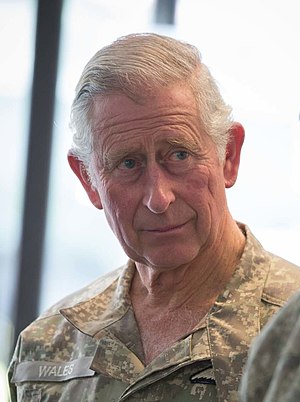Charles III: Difference between revisions
imported>John Stephenson (cleanu; WP; footnote; Camilla; William and Harry) |
mNo edit summary |
||
| (25 intermediate revisions by 10 users not shown) | |||
| Line 1: | Line 1: | ||
{{subpages}} | {{subpages}} | ||
{{Image|Prince Charles in NZ.jpg|right|300px|Charles III in 2015 (then Prince of Wales)}} | |||
King '''Charles III''' ('''Charles Philip Arthur George'''<!--<ref>His surname is Windsor, though the British Royal Family rarely use the name. </ref>-->; born 14 November 1948) is the [[Monarchy of the United Kingdom|King of the United Kingdom]] and various other countries where the [[United Kingdom|UK]] [[monarchy|monarch]] is [[Head of State]].<ref name="royal_family_name"/> He was the eldest son of [[Elizabeth II of the United Kingdom|Elizabeth II ]] and [[Prince Philip, Duke of Edinburgh]], and held the heir apparent's title [[Prince of Wales]] from 1958 until 2022. | |||
Charles has been married to [[Camilla | Charles has been married to his consort<ref>A queen consort is not a ruler in her own right and is not in line to rule.</ref> [[Queen Camilla]] since April 2005. His previous marriage to [[Diana, Princess of Wales]] ended in divorce in August 1996. From his first marriage, Charles has two sons, [[William, Prince of Wales|William]] and [[Prince Harry, Duke of Sussex|Harry]]. | ||
William's three children are [[George Mountbatten-Windsor|George]], [[Charlotte Mountbatten-Windsor|Charlotte]] and [[Louis Mountbatten-Windsor|Louis]]. Harry's two children are [[Archie Mountbatten-Windsor|Archie]] and [[Lilibet Mountbatten-Windsor|Lilibet]]. Changes were made to the rules of succession, prior to Charlotte's birth, giving daughters and sons equal precedence, so Charlotte comes immediately after her older brother George, whereas her great-aunt [[Anne, Princess Royal|Princess Anne]] had followed her younger brother [[Edward, Duke of Edinburgh|Edward]].<ref name=Cnn2018-04-23/> | |||
==See also== | |||
* [[Elizabeth II of the United Kingdom]] | |||
* [[Prince Philip, Duke of Edinburgh]] | |||
==Footnotes== | ==Footnotes== | ||
{{reflist|2}} | {{reflist|refs= | ||
<ref name="royal_family_name"> | |||
{{Cite web | |||
| title = The Royal Family name | |||
| url = http://www.royal.gov.uk/ThecurrentRoyalFamily/TheRoyalFamilyname/Overview.aspx | |||
| url-status = dead | |||
| archive-url = https://web.archive.org/web/20090215182305/http://www.royal.gov.uk/ThecurrentRoyalFamily/TheRoyalFamilyname/Overview.aspx | |||
| archive-date = 15 February 2009 | |||
| access-date = 3 February 2009 | |||
| website = Official website of the British monarchy | |||
}} | |||
https://web.archive.org/web/20090215182305/http://www.royal.gov.uk/ThecurrentRoyalFamily/TheRoyalFamilyname/Overview.aspx mirror] | |||
</ref> | |||
<ref name=Cnn2018-04-23> | |||
{{cite news | |||
| url = https://www.cnn.com/2018/04/23/world/princess-charlotte-royal-baby-succession-trnd/index.html | |||
| title = How Princess Charlotte, 2, just made royal history | |||
| work = CNN | |||
| author = Andrea Diaz | |||
| date = 2018-04-23 | |||
| page = | |||
| location = | |||
| archiveurl = https://web.archive.org/web/20180424005105/https://www.cnn.com/2018/04/23/world/princess-charlotte-royal-baby-succession-trnd/index.html | |||
| archivedate = 2018-04-24 | |||
| accessdate = 2024-01-07 | |||
| url-status = live | |||
| quote = It’s all thanks to the Succession to the Crown Act of 2013, which changed tradition to state that the gender of a royal born after October 28, 2011 does not give that person, or their descendants, precedence over anyone else in determining the next monarch. | |||
}} | |||
</ref> | |||
}}[[Category:Suggestion Bot Tag]] | |||
Latest revision as of 07:01, 27 July 2024
King Charles III (Charles Philip Arthur George; born 14 November 1948) is the King of the United Kingdom and various other countries where the UK monarch is Head of State.[1] He was the eldest son of Elizabeth II and Prince Philip, Duke of Edinburgh, and held the heir apparent's title Prince of Wales from 1958 until 2022.
Charles has been married to his consort[2] Queen Camilla since April 2005. His previous marriage to Diana, Princess of Wales ended in divorce in August 1996. From his first marriage, Charles has two sons, William and Harry.
William's three children are George, Charlotte and Louis. Harry's two children are Archie and Lilibet. Changes were made to the rules of succession, prior to Charlotte's birth, giving daughters and sons equal precedence, so Charlotte comes immediately after her older brother George, whereas her great-aunt Princess Anne had followed her younger brother Edward.[3]
See also
Footnotes
- ↑ The Royal Family name. https://web.archive.org/web/20090215182305/http://www.royal.gov.uk/ThecurrentRoyalFamily/TheRoyalFamilyname/Overview.aspx mirror]
- ↑ A queen consort is not a ruler in her own right and is not in line to rule.
- ↑ Andrea Diaz. How Princess Charlotte, 2, just made royal history, CNN, 2018-04-23. Retrieved on 2024-01-07. “It’s all thanks to the Succession to the Crown Act of 2013, which changed tradition to state that the gender of a royal born after October 28, 2011 does not give that person, or their descendants, precedence over anyone else in determining the next monarch.”
